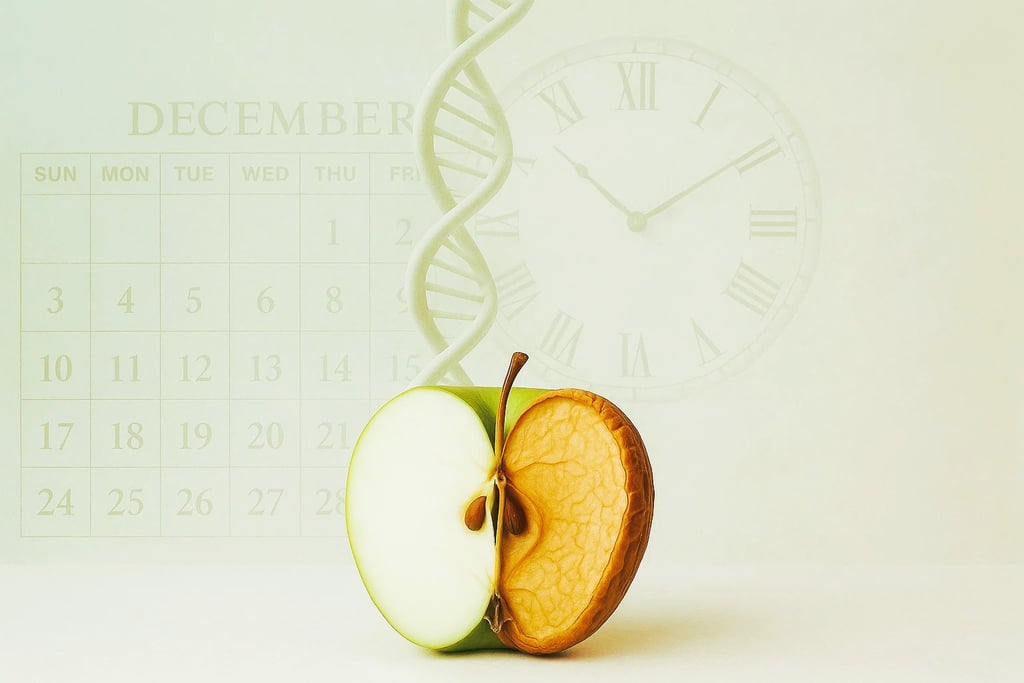Biological vs. Chronological Age: Practical Guide to Healthy Aging
HEALTH AND WELLNESS
Tarun Mehta
8/8/20254 min read


Biological vs. Chronological Age: Practical Guide to Healthy Aging
When someone asks your age, the answer probably comes easily: “I’m 35,” or “Just turned 50.” That is your chronological age, which is the number of years you have lived since birth. But have you ever felt much younger (or older) than that number? Maybe you’ve noticed your energy levels do not quite match your peers. Or perhaps you have been told you “You don’t look your age.” This is where the idea of biological age comes into play.
Your biological age is more about how your body is functioning than how many candles are on your birthday cake. And in today’s world, where wellness is becoming a lifestyle, more people are paying attention to this difference.
Let us explore what biological age means, how it differs from chronological age, and what actions you can take to help your body feel younger, no matter what the calendar says.
Understanding the Two Types of Age
Chronological age is straightforward. It is calculated from your birthdate. Every year, it goes up by one, with no exceptions.
Biological age, on the other hand, indicates the true condition of your body and how effectively it is functioning. It considers various health-related metrics like:
Your fitness level
Nutrition
Sleep quality
Stress management and levels
Skin health
Mental clarity and sharpness
Two people can be 45 years old on paper, but one might feel and move like someone in their thirties, while the other feels like they are in their sixties. That is the impact of lifestyle choices, environment, and genetics.
What Influences Biological Age?
Biological age is shaped by a combination of factors, some within your control, and some not. Here are the main influences:
Lifestyle Habits
What you do every day plays a major role. Regular exercise, healthy eating, enough sleep, and avoiding harmful habits (like smoking or excessive alcohol) help keep your body younger on the inside.Stress and Mental Health
Chronic stress can wear your body down, raising inflammation and weakening your immune system. On the other hand, good mental health, mindfulness practices, and strong social connections can help protect your biological youth.Sleep Quality
Poor sleep affects everything from your mood to your skin to your memory. People who consistently sleep well often show signs of slower biological aging.Genetics
Of course, genetics play a part. Some people are naturally more resilient, while others may be more prone to certain conditions. But genes are not your destiny, your daily habits still have a powerful effect.Environmental Exposure
Air quality, exposure to sunlight, toxins, and even noise levels can impact how your body ages over time.
Signs You Might Be Biologically Younger (or Older)
Wondering where you might fall on the spectrum? While exact testing requires medical evaluation or lab tests, here are some general indicators to help you understand where you stand:
You might be biologically younger if:
You have steady energy throughout the day.
Your skin looks vibrant and healthy.
You sleep well and wake up refreshed.
You recover quickly from minor illnesses.
You feel mentally sharp and focused.
You are physically active without feeling overly strained.
You might be biologically older if:
You often feel tired or sluggish.
You are frequently sick or take longer to heal.
You have trouble sleeping or staying asleep.
You notice joint pain, stiffness, or low mobility.
You feel foggy, forgetful, or mentally exhausted.
Can You Change Your Biological Age?
The encouraging news is yes, you can influence your biological age, even if you are already feeling the effects of aging. Unlike your birth certificate, your biological age is not fixed.
Making consistent, positive changes in your lifestyle will slow down or even reverse certain signs of aging. Let us understand these changes now.
Small Changes That Make a Big Difference
You do not need a total life overhaul to help you improve your health. Instead, focus on building simple, supportive habits that help your body and mind work better over time.
Get Moving: Aim to include at least 30 minutes of moderate exercise in your daily routine for most days. Walking, swimming, yoga, and dancing all count. Regular movement supports heart health, reduces stress, improves mood, and keeps your body flexible and strong.
Fuel Your Body Wisely: Eat more whole foods, fresh fruits, vegetables, lean proteins, whole grains, and healthy fats. Reduce processed foods, excess sugar, and fried snacks. Stay hydrated with water throughout the day.
Prioritize Sleep: Create a calming evening routine. Limit screens before bed, keep your bedroom cool and quiet, and aim to sleep and wake at the same time every day. Adults usually need 7-9 hours of good-quality sleep.
Manage Stress in Healthy Ways: Practice deep breathing, meditation, journaling, or take regular walks in nature. Even five quiet minutes a day can calm your nervous system and reduce internal stress.
Connect With Others: Strong social connections are linked to longer life and better health. Spend time with people who uplift you. Laugh often. Share your thoughts. Stay engaged in your community.
Challenge Your Brain: Lifelong learning keeps your mind sharp. Try reading, puzzles, learning a new language, skill, or instrument, or simply staying curious about the world.
Shifting the Focus From Age to Health
It is natural to focus on age when we think about health. But the real question isn’t “How old are you?” It is “How well are you aging?”
Looking and feeling younger than your years is about creating a life that supports energy, resilience, and joy. Aging is a part of life, but how you experience it can differ greatly depending on the choices you make today.
Action Summary: Steps to Support a Younger Biological Age
Here is a quick checklist to get you started:
Physical activity: Strive for at least 30 minutes of physical activity most days.
Eat clean: Focus on whole, nutritious foods.
Sleep well: Build habits for deep, restful sleep.
Stress less: Try mindfulness, breathing, or quiet time daily.
Stay social: Nurture meaningful relationships.
Keep learning: Engage your mind with new activities.
Hydrate well: Drink plenty of water daily.
Cut back: Limit smoking, alcohol, and processed foods.
Start small. Pick one or two areas to focus on this week. Over time, these changes add up helping you feel better, live longer, and maybe even turn back the clock a little.
Final Thought
Your age does not have to define how you feel. By attuning to your body, cultivating healthy habits, and nurturing your mental health, you can age with vitality, mental clarity, and resilience.
You cannot change when you were born, but you can change how you live each day. And that might just make all the difference for you to lead a happy and healthy life.
You can assess your biological age by accessing our survey here.
Video available at: https://youtu.be/teBZ_BYqY5U

Ascend2Elevate
Transform today, Thrive tomorrow
© 2026. All rights reserved.
PS: The content on the website are the author's viewpoint and opinion. Kindly follow any tips or advice at your own discretion and ensure they suit your needs and personal situation. Please check our T&C page for more details (ascend2elevate.com.au/terms-and-conditions)
Office 4074, Ground Floor, 470, St Kilda Rd, Melbourne, VIC-3004, Australia
